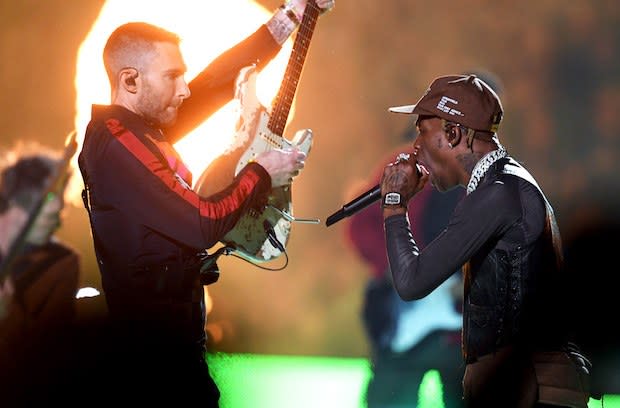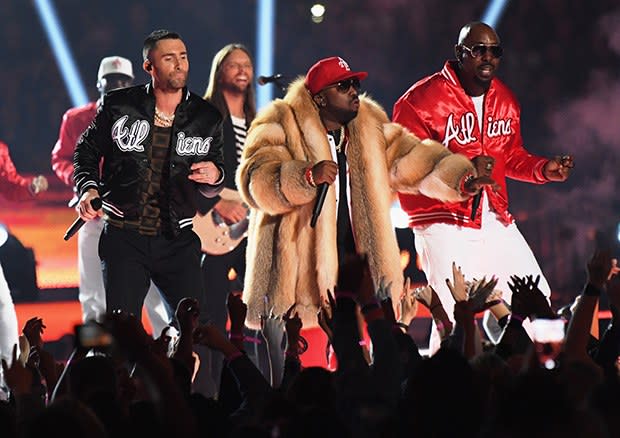Maroon 5 at the Super Bowl: A Game Everyone Lost
Viewed in a vacuum, the selection of Maroon 5 for this year’s Super Bowl halftime show made a lot of sense. Led by Adam Levine—adult-contemporary sex-ish symbol, coach on “The Voice,” clothing designer—the group has ridden the shifting tides of 21st-century pop better than most other entities. In the 2000s, they became radio fixtures with their slick pop soul, which took as many cues from *NSYNC as it did from Hall & Oates. This decade, they’ve slapped their brand on singles that anticipated and embraced current pop trends like octave-leaping vocal hooks and skittering synth-pop backing tracks, using top-tier guest stars and proven-hitmaker song doctors to seal the deal. “Girls Like You,” their Cardi B-featuring ode to ladies who love jerks, was one of the 11 songs that topped the charts last year, and their third No. 1 of the 2010s.
But in the greater scheme of things, Maroon 5 were an also-ran, a band booked in part because Levine and co. were willing to overlook the controversies swirling around the NFL—particularly its team owners’ reluctance to sign quarterback Colin Kaepernick for non-performance reasons. The former San Francisco 49er began kneeling during the national anthem to remind viewers of racial inequality in 2016; that was the last season he played at the NFL level, while lesser quarterbacks have continued to get signed. Rihanna reportedly declined the halftime show because she “supports Colin Kaepernick”; Jay-Z made his distaste for the NFL known in the Carters’ “APESHIT.” At some point since Kaepernick’s ice-out, the Super Bowl halftime show became something the biggest stars aspired to turn down, not play.
And so, Maroon 5 became the second white-boy soul act in a row to headline the halftime show, on the heels of last year’s wan, Prince-jocking set by Justin Timberlake. While JT’s performance was notable for its drive to please everyone, Maroon 5’s was defined by who wasn’t there. The group’s unspoken assurance that it’s really a band, and not a Levine-fronted cross-promotional effort between “The Voice” and pop’s leading songwriters, only made those absences more pronounced.
The set kicked off with a jagged spin through Maroon 5’s 2002 debut single, “Harder to Breathe,” which pairs pop-funk crunch with tense lyrics about a bad relationship. (Comparing the density of syllables between the hip-checking “Harder”—which opens with “How dare you say that my behavior is unacceptable/So condescending unnecessarily critical”—and the zig-zagging “Girls Like You” shows how pop songwriting has evolved into something that aspires to be as unchallenging as its most dogged critics claim.) From there, the band went into another track from its debut, Songs About Jane: “This Love,” a still mildly crisp showcase for Levine’s falsetto. He also attempted to flaunt his guitar-hero bona fides, but his “Can I play guitar for you right now?” was followed by a wide shot that didn’t show off the soloing-by-numbers he was doing. The reasons for that choice are anyone’s guess; perhaps the control room felt that the specter of Prince still loomed too heavily for anything Levine did to be impressive.
Another ghost hovering over Atlanta’s Mercedes-Benz Stadium: Drake, the king of last year’s charts. The set’s first guest, Travis Scott, was introduced by a video package that remade a viral tweet pairing the “Sweet Victory” halftime show from “SpongeBob SquarePants” with his smash single “Sicko Mode.” While the online petitions for Maroon 5 to play “Sweet Victory” were thankfully, if surprisingly, ignored, the “SpongeBob” footage led to Scott entering the stadium, via augmented-reality comet, backed by Drake's piped-in vocal intro to "Sicko Mode." Scott is a charismatic performer who made the most of his 90-ish seconds onstage, surrounded by flames and flanked by an awkwardly hopping Levine, although his declaration that he “ain’t by the book” was a bit rich given the circumstances.

Pepsi Super Bowl LIII Halftime Show
Cardi B, whose self-affirming verse on “Girls Like You” undoubtedly helped its Hot 100 ascent, passed on performing at the halftime show; “There’s a man who sacrificed his job for us, so we got to stand behind him,” she told the Associated Press. (She did, however, perform her verse at a Super Bowl pre-party sponsored by Bud Light.) Maroon 5, in turn, decided to give the song gravitas via drumline and gospel choir (the youth percussion ensemble Equinox Percussion and the Voice of Atlanta choir, respectively), an effective yet somewhat basic choice. From there, it was onto another Songs About Jane track: “She Will Be Loved,” a ballad that owes as much to the verses of Cheap Trick’s 1988 weeper “The Flame” as it does to the itchiness of Levine’s falsetto. Drone lanterns lighting up the limply inspiring message “ONE LOVE” only further highlighted the absence of those who’d turned down the NFL for refusing to dig deeper into what those two words actually mean.
The mood shifted when OutKast’s Big Boi, the one scion of local hip-hop willing to appear on the neon “M” catwalk, drove up in a convertible Cadillac, rapping the introduction to his Purple Ribbon All-Stars’ “Kryptonite (I’m On It).” Clad in a massive fur and his own “ATL” flat-brim, he launched into Speakerboxxx/The Love Below’s “The Way You Move,” OutKast’s last No. 1 to date. “Move” hook man Sleepy Brown was assisted by Levine on the song’s chorus, and it was fine, but the sight of Levine sporting an ATLiens jacket while André 3000’s nowhere to be found was a bit soul-sucking.

Pepsi Super Bowl LIII Halftime Show
Levine’s assortment of tops throughout the evening turned him into a sort of Russian nesting doll Magic Mike. He sported a tank top during the limp run-through of 2015’s “Sugar” and whipped it off for a grand-ish finale: the band’s “Voice”-assisted 2011 comeback hit “Moves Like Jagger,” which, in an era of horrible attempts to be sexy, still stands out for the line “take me by the tongue.” (Congratulations?) The mix emphasized the flinty guitars that give the song its move, rather than the insistent whistle that made it a pop-radio mainstay, allowing for a big rock’n’roll finish with fireworks, pyro, and a massive drumroll.
While Sunday night proved once again that Maroon 5’s strongest material mostly appeared on its early albums, it also showed that where the halftime show might go from here is anyone’s guess. Since the producers’ turn away from “heritage” acts like Bruce Springsteen and the Who with 2011’s booking of the Black Eyed Peas, the Super Bowl has exhausted Top 40’s reserves of current megastars. Pop’s streaming-era consolidation and fragmentation, plus the aging of classic-rock stalwarts and MTV-era megasellers, has led to the number of potential headliners shrinking at a rapid rate. Crowd-pleasers with high Q ratings like Taylor Swift and Kelly Clarkson are still out there; whether or not they want to play the halftime show—which is unpaid and now has a lot of baggage attached—is unclear.
There’s been a resistance toward booking anything with even a passing resemblance to country music since around 2003’s Shania Twain performance. On one level, it’s odd: Artists like Kenny Chesney and Luke Bryan have been filling stadiums without the help of a football game for years now. On another, it makes sense: Acts like Kane Brown and Jason Aldean hit No. 1 on the album charts last year and sell out large-scale venues, but their singles rarely cross over to the lite-FM ubiquity enjoyed by those who have headlined since the show’s turn toward pop. The antipathy toward country may wash away in a year’s time, if only out of sheer necessity and an unwillingness to go back to the days of Up With People and Elvis Presto halftime shows. But given the reason that big names like Rihanna and Cardi opted out, the chirpily retro nature of the latter options might be a more appropriate representation of where, exactly, the league’s ruling classes stand.
